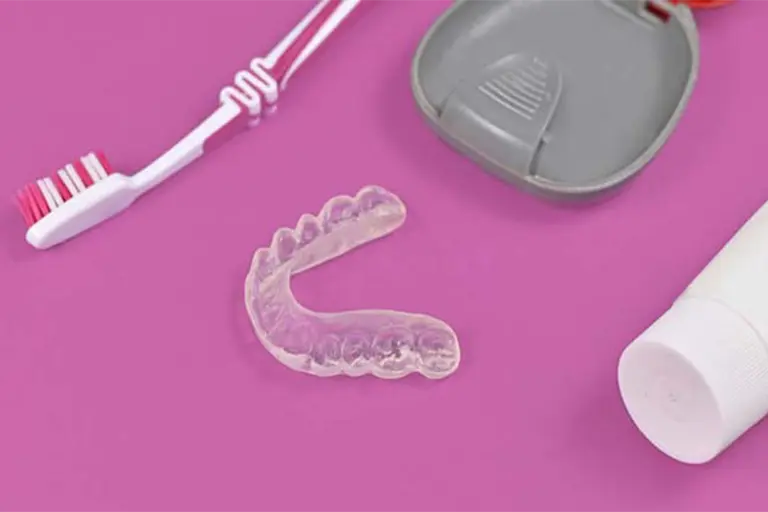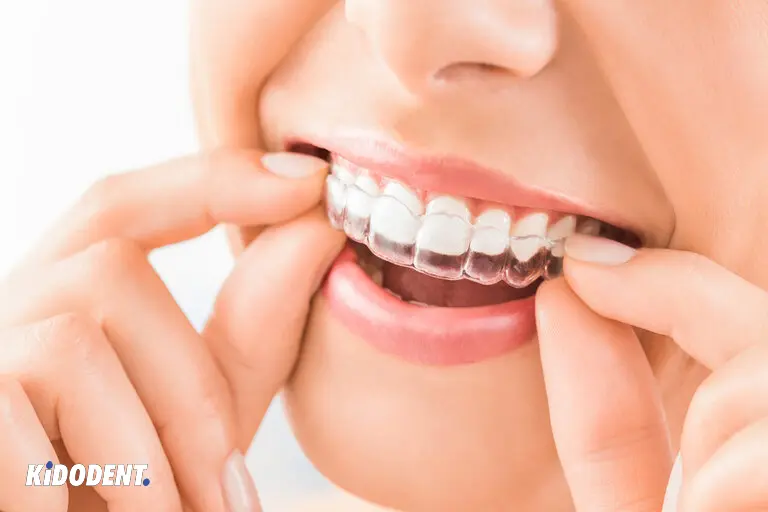A mouthguard, also called night guard, is a dental device to protect your teeth from injuries during sports or from teeth grinding while sleeping. But you might also wear a mouthguard to treat your temporomandibular joint disorder (TMJ), sleep apnea, or snoring. As for any dental tools, it is important to keep your mouthguard clean. Without regular cleaning, the bacteria in your mouth can grow and multiply on the mouthguard, causing infection, bad breath, and gum disease. Learn how to clean your mouthguard to ensure it is free of food debris and bacteria so that it works properly and prevents any oral health risks.
Why is it important to clean your mouthguard?
Mouthguards retain food particles and pick up bacterial plaque after you wear them. Just as our teeth need to be cleaned daily to remove plaque bacteria and stuck food particles off of them, we need to add oral hygiene routine to the oral appliances we use like our mouthguard and toothbrush.
No matter what type of mouthguards you use, the OTC ones used while playing sports, or the custom ones for your teeth grinding, these mouthpieces need cleaning. Our toothbrushes and mouthguards can be the breeding ground for the bacterial plaque to thrive and the food debris to hide.
Not cleaning your mouthguard regularly can lead to the accumulation of bacteria and germs. This causes a number of negative effects on your oral health, including:
- Bad breath
- Tooth decay
- Receding gums
- Periodontal diseases
- Development of yeast and life-threatening oral infections
How often should you clean your mouthguard?
According to the Journal of the American Dental Association (JADA), you should keep your mouthguard clean and dry between uses. Therefore, to do this:
- Rinse the mouthguard with cool water before and after each use or brush with toothbrush and toothpaste.
- Clean the mouthguard regularly in cool, soapy water and then rinse it.
Also, ADA recommends that you:
- Bring your mouthguard to your regular dental visits so that it will be checked for any sign of wear. Your dentist can also do a deep cleaning of the mouthguard.
- Store your mouthguard in a sturdy container that has vents to keep it dry and prevent bacteria from growing on it.
How to clean my mouthguard: Essential tips
Cleaning your mouthguard is easy and there are many home methods to use to sanitize your night guard.
Toothpaste
Just like how you brush your teeth, you can brush a mouthguard with a toothbrush and toothpaste. But be sure to use a soft-bristled toothbrush and nonabrasive toothpaste.
It is also required to have a separate toothbrush for this purpose and not use your personal teeth cleaning toothbrush. This will prevent the development of cross-contamination risk.
Here are the steps to do that:
- Rinse the mouthguard with cool water.
- Apply the nonabrasive toothpaste to the mouthguard and brush gently.
- Rinse the guard with cool water to get off the toothpaste thoroughly.
- Place it in its vented container to dry completely.

Soap and water
As ADA suggests, soap and water come as a great cleaning option to keep your night guard sanitized. You can also use a toothbrush to try deeper cleaning in the process.
Use mild, alcohol-free soap like regular dish soap or antibacterial soap in order to avoid damaging the mouthguard. To do the cleaning, prepare soapy cool water in a bowl and gently brush. Rinse the mouthguard with cool water and let it dry.
Mouthwash
Mouthwashes are another home option to clean your mouthguard in conjunction with soap and water cleaning methods. Mouthwash will kill germs on your mouthguard effectively due to its antiseptic properties. Keep in mind to use alcohol-free mouthwash in order to avoid damaging your device.
In addition, if you want a minty fresh with your night guard before wearing it, swirling it in a glass of water with a few drops of mouthwash added will freshen your mouth, too.
Here is how you can clean your mouthguard using mouthwash for a deeper clean once in a while:
- Like other methods, first, rinse your mouthguard with cool water.
- Add some (a capful) of mouthwash into a glass of cool water.
- Soak the mouthguard for 20 to 30 minutes.
- Let the mouthguard air-dry in its case.
Hydrogen peroxide and vinegar
Hydrogen peroxide and vinegar are great natural cleaning solutions to deep clean your dental pieces like your mouthguard. You can soak the mouthguard for 20 to 30 minutes. Hydrogen peroxide and vinegar prevent the buildup of bacteria and are great ways to remove stains from your night guard.
Do as follows:
- Rinse your mouthguard in cool water.
- Use a 10:1 blend of water and vinegar.
- After soaking for 30 minutes, rinse the mouthguard again with cool water.
- Now add hydrogen peroxide into the water and let the mouthguard in the solution for 30 minutes.
- Rinse it again with cool water and let it dry completely.
Denture cleaner
If you don’t want to use hydrogen peroxide, soap, or toothpaste, an over-the-counter denture cleaner is a safe alternative to clean your mouthguard easily.
While soap does not help with staining, you can remove stains and discoloration by weekly soaking your device in denture cleaner. Denture cleaner products contain stronger bleach and are available as tablets or powders.
You can simply place the mouthguard in a bowl or glass of water and add the cleaner to dissolve into the water. Then allow the mouthguard to remain in the solution for 10 minutes or as directed by the package’s instruction.
Conclusion
No matter whether you have a dentist-prescribed custom mouthguard or you are using athletic mouthguards, it is crucial to maintain daily cleaning of your dental device. Also, do remember that your dentist is the ultimate person to reach out to for your oral care routine. So, during your regular dental visits, talk to your dentist about the best ways to take care of your mouthguard.
You can also bring the mouthguard for deep clean or retainers if you are undergoing orthodontic treatment. Your dentist can perform deep cleaning on the mouthguard for you as they have access to stronger chemicals which average person may not have.
Frequently asked questions
For everyday cleaning, rinse your mouthguard under cool water and brush it with soap or toothpaste. For deeper cleaning, soak your mouthguard in diluted water with hydrogen peroxide and vinegar for 30 minutes. You can also try the combination of denture cleaner with water or mouthwash and water.
Yes, you can. But be careful not to soak the mouthguard/night guard for a long period of time or overnight. Mouthwash and denture cleaner products are considered safe for cleaning mouthguards.
For denture cleaner, the soaking time can be around 10 minutes, or what the package’s directions recommend. If you are using mouthwash, 30 minutes is enough.
Soak the mouthguard in a glass of diluted vinegar for 30 minutes and then rinse it with cool water. In the next step, add hydrogen peroxide to the water and allow the mouthguard to soak for another 30 minutes. Let it dry. For optimal stain removal, get OTC denture cleaner, which will scrub away stains from your mouthguard.
